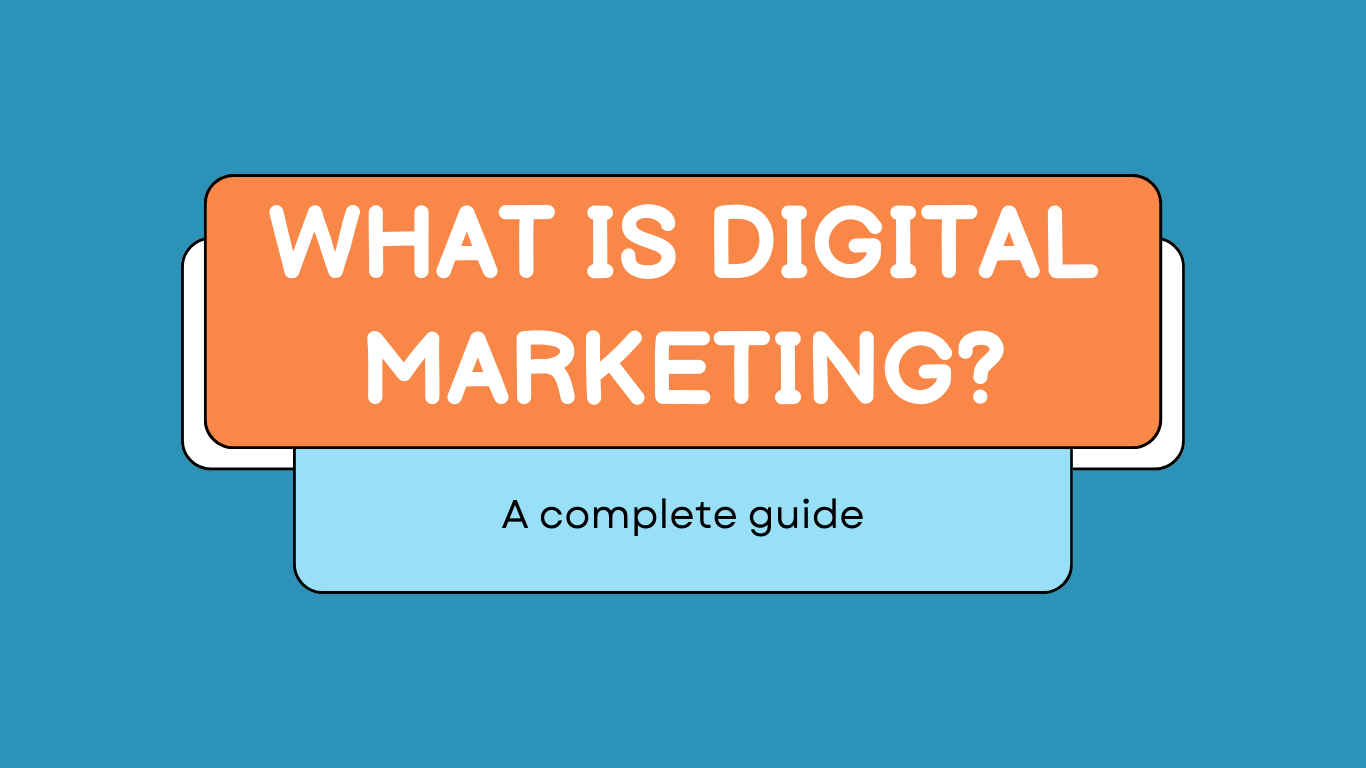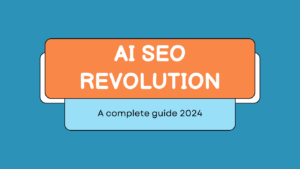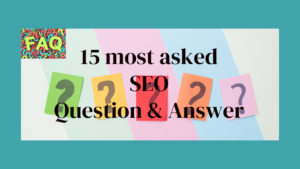In today’s hyper-connected world, where every click, swipe, and tap shapes our daily interactions, traditional marketing strategies are rapidly being eclipsed by the dynamic landscape of digital marketing. As businesses strive to stay ahead in the digital race, understanding the complexity of this ever-evolving domain becomes paramount. So, lets embark on your journey to digital success with our comprehensive guide to mastering digital marketing strategies!
Did you know, on the daily basis almost 8 billion searches Google handle. Atleast 3-4 times people searches daily. As a marketer, leveraging the digital world through online advertising is crucial for establishing a brand and enhancing customer experience. This not only attracts potential customers but also strengthens your digital strategy.
What is Digital Marketing?
Digital marketing is the art and science of promoting products or services using digital channels. In essence, it’s reaching out to potential customers through the vast online landscape. Imagine traditional marketing tactics like billboards, newspaper ads, and flyers, but in a digital format.
From social media platforms like Facebook and Instagram to search engines like Google, digital marketing encompasses a wide array of strategies to connect with your target audience. Whether it’s through engaging social media posts, informative blog articles, or eye-catching display ads, the goal remains the same: to attract, engage, and ultimately convert prospects into loyal customers.
What sets digital marketing apart from its traditional counterpart is its ability to be highly targeted and measurable. With tools like Google Analytics and Facebook Insights, marketers can track the performance of their campaigns in real-time, gaining valuable insights into what works and what doesn’t.
In today’s digital age, where consumers spend a significant amount of time online, embracing digital marketing is not just a choice but a necessity for businesses looking to thrive in the competitive landscape. So, this guide will help you whether you’re a small startup or a multinational corporation, understanding the fundamentals of digital marketing is paramount for success in the digital era.
Why Digital Marketing Important?
In today’s fast-paced, interconnected world, digital marketing has emerged as a vital tool for businesses of all sizes. But why is it so important?
First and foremost, digital marketing allows businesses to reach a global audience with ease. Unlike traditional marketing methods that are often limited by geography and budget constraints, digital marketing offers a level playing field where even small businesses can compete on a global scale.
Moreover, digital marketing is incredibly cost-effective compared to traditional advertising channels. With digital ads, businesses can target their audience with pinpoint accuracy, ensuring that every marketing dollar is spent efficiently.
But perhaps the most compelling reason why digital marketing is indispensable is its ability to generate valuable insights and data. Through tools like Google Analytics and social media analytics, businesses can track the performance of their campaigns in real-time, gaining valuable insights into customer behavior and preferences. This data-driven approach not only allows businesses to optimize their marketing efforts but also fosters better customer relationships through personalized experiences.
In essence, digital marketing isn’t just about promoting products or services; it’s about building meaningful connections with customers in the digital age. So, whether you’re a budding entrepreneur or a seasoned business owner, embracing digital marketing is essential for staying relevant and competitive in today’s ever-evolving marketplace.
Types of Digital Marketing
In this comprehensive guide, we’ll go through various types of digital marketing, exploring their unique characteristics, benefits, and best practices. Whether you’re a seasoned marketer looking to expand your digital toolkit or a budding entrepreneur seeking to establish an online presence, understanding the diverse array of digital marketing strategies is essential for success in today’s digital age.
SEO, or Search Engine Optimization
Search Engine Optimization (SEO) is the cornerstone of digital marketing, focusing on optimizing websites to rank higher in search engine results pages (SERPs) and attract organic traffic. Let’s explore some key strategies, tools, and concepts that can elevate your SEO game:
- Content is King: High-quality, relevant content lies at the heart of SEO. By creating informative, engaging content that addresses the needs and interests of your target audience, you not only provide value but also increase your chances of ranking higher in search results.
- Keyword Research: Keywords are the building blocks of SEO. Conducting thorough keyword research using tools like Google Keyword Planner, SEMrush, or Ahrefs helps identify the terms and phrases your audience is searching for. Incorporating these keywords strategically into your content can boost your visibility in search results.
- On-page optimization involves optimizing various elements on your website to improve its search engine visibility. This includes optimizing title tags, meta descriptions, headings, URL structures, and internal linking. By ensuring that each page is well-optimized for specific keywords, you enhance your chances of ranking higher in SERPs.
- Technical SEO focuses on optimizing the technical aspects of your website to ensure smooth crawling and indexing by search engines. This includes optimizing site speed, mobile responsiveness, site structure, and fixing any technical errors that may hinder search engine visibility. Tools like Google Search Console and Screaming Frog can help identify and address technical issues.
- Backlinks remain a crucial ranking factor in SEO. Acquiring high-quality backlinks from authoritative websites signals to search engines that your site is credible and valuable. Engage in strategic link-building tactics such as guest blogging, influencer outreach, and content promotion to earn valuable backlinks.
- Local SEO: For businesses with a physical presence or serving a specific geographic area, local SEO is essential. Optimizing your website and online presence to appear in local search results can help attract local customers. Claim and optimize your Google My Business listing, acquire local citations, and garner positive reviews to improve your local SEO.
Read the full article step by step for SEO optimization.
By implementing these strategies and utilizing the right tools, you can enhance your website’s visibility, attract more organic traffic, and ultimately, achieve your digital marketing goals through the power of SEO.
Content Marketing
Content marketing stands as a pillar in the digital marketing landscape, leveraging the distribution of valuable and relevant content to engage with target audiences. Unlike traditional advertising, which often focuses on promoting products or services directly, content marketing seeks to provide value upfront, establishing trust and building relationships through various forms of content.
At the heart of content marketing lies the creation of high-quality content that resonates with your audience. This content takes various forms, including blog posts, e-books, newsletters, videos, whitepapers, infographics, and more. Each piece of content serves as a vehicle to educate, entertain, or inspire your audience, offering solutions to their pain points or addressing their interests and needs.
To achieve this, content marketers must first understand their audience intimately. Who are they? What are their pain points, interests, and preferences? Armed with this knowledge, marketers can tailor their content to address specific needs and preferences, ensuring relevance and resonance.
Furthermore, content marketers must choose the right formats for their content. Whether it’s informative blog posts, engaging videos, actionable worksheets, or visually appealing infographics, selecting the appropriate format can enhance the effectiveness of your content marketing efforts.
Adhering to content marketing best practices is essential for success. This includes ensuring grammatical correctness, clarity, and relevance in your content. Additionally, each piece of content should guide readers seamlessly through the sales funnel, leading them closer to conversion or engagement with your brand.
In essence, content marketing is not just about creating content for the sake of it. It’s about delivering value, establishing authority, and fostering meaningful connections with your audience. By adopting effective content strategies and adhering to best practices, businesses can unlock the full potential of content marketing in driving growth and achieving their digital marketing goals.
Pay per click Advertisement
In the dynamic realm of digital marketing, pay-per-click (PPC) advertising stands out as a powerful tool for businesses to reach their target audience with precision and efficiency. Unlike traditional advertising models where businesses pay a fixed amount regardless of the ad’s performance, PPC advertising allows advertisers to pay only when their ad is clicked, making it a cost-effective and results-driven approach to digital marketing.
At its core, PPC advertising operates on the principle of bidding for ad placement in search engine results or on relevant websites. When users enter specific keywords related to a business’s products or services, the search engine displays relevant ads based on various factors such as bid amount, ad quality, and relevance. Advertisers bid on these keywords, and the highest bidder typically secures the top ad placement.
One of the key advantages of PPC advertising is its unparalleled targeting capabilities. Advertisers can target their ads based on a variety of factors such as location, demographics, interests, and even specific keywords. This level of granularity allows businesses to tailor their messaging to highly specific audience segments, ensuring maximum relevance and engagement.
Moreover, PPC advertising offers instant visibility and measurable results. Unlike other forms of digital marketing that may take time to gain traction, PPC ads appear prominently in search results or on relevant websites as soon as the campaign is launched. Additionally, advertisers have access to detailed analytics and performance metrics, allowing them to track the effectiveness of their campaigns in real-time and make data-driven decisions to optimize performance.
Furthermore, ongoing monitoring and optimization are essential to ensure the success of PPC campaigns. Advertisers must continually analyze performance metrics such as click-through rate (CTR), conversion rate, and return on investment (ROI), tweaking their campaigns accordingly to maximize results and minimize wasteful spending.
In summary, pay-per-click (PPC) advertising represents a cornerstone of digital marketing, offering unparalleled targeting capabilities, instant visibility, and measurable results. By understanding its intricacies and implementing effective strategies, businesses can leverage PPC advertising to enhance their online presence, drive traffic, and ultimately, achieve their digital marketing objectives with precision and efficiency.
Email Marketing
In the vast landscape of digital marketing, email marketing remains a stalwart strategy for businesses seeking to connect with their audience in a direct and personal manner. By leveraging the power of email, businesses can deliver targeted messages, nurture leads, and drive conversions effectively.
At its core, email marketing involves the strategic use of email to communicate with current and potential customers. Unlike other forms of digital marketing that rely on reaching audiences through external platforms, email marketing allows businesses to maintain direct contact with their subscribers, fostering stronger relationships and building brand loyalty over time.
One of the key advantages of email marketing is its versatility and scalability. Whether it’s sending promotional offers, newsletters, product updates, or personalized recommendations, businesses can tailor their email content to suit the preferences and interests of their audience segments. This level of customization not only enhances engagement but also increases the likelihood of conversions.
Moreover, email marketing offers unparalleled targeting capabilities. Through segmentation and personalization, businesses can divide their email list into distinct segments based on demographics, behaviors, or purchase history, allowing them to deliver highly relevant and targeted messages to each segment. This targeted approach not only improves the effectiveness of email campaigns but also enhances the overall customer experience.
Crafting compelling email content that resonates with the audience, optimizing email designs for mobile responsiveness, and continually testing and refining email campaigns are essential components of a successful email marketing strategy.
In summary, email marketing remains a cornerstone of digital marketing, offering businesses a direct and personal channel to engage with their audience, nurture leads, and drive conversions. By understanding its principles and implementing effective strategies, businesses can unlock the full potential of email marketing to achieve their digital marketing objectives and foster long-term success.
Social Media Marketing
Social media marketing is a dynamic digital strategy leveraging platforms like Facebook, Instagram, Twitter, LinkedIn, and Pinterest to engage audiences, heighten brand awareness, and foster engagement.
Central to social media marketing is the creation and dissemination of diverse content formats – posts, images, videos, stories, and live streams – tailored to resonate with target audience preferences and behaviors. This approach offers businesses the opportunity to reach a vast and diverse audience with precise targeting options based on demographics, interests, behaviors, and more, thereby increasing relevance and effectiveness.
Moreover, social media platforms serve as hubs for engagement and interaction. From responding to comments and messages to hosting Q&A sessions and running polls, businesses can foster meaningful connections, brand loyalty, and advocacy.
However, effective social media marketing demands strategic planning, cohesive content strategies, and continuous optimization. This involves maintaining a consistent brand voice, analyzing performance metrics, and adapting tactics based on insights to maximize results.
In essence, social media marketing empowers businesses to amplify their online presence, drive traffic, and achieve digital marketing objectives through targeted engagement and relationship-building
Influencer Marketing
Influencer marketing is a dynamic strategy within digital marketing that harnesses the influence of individuals with large and engaged followings on social media platforms. Unlike traditional marketing, which relies on direct brand promotion, influencer marketing involves partnering with influencers to authentically endorse products or services to their audience.
Influencer marketing is about leveraging the trust and credibility that influencers have built with their followers. Influencers, ranging from micro-influencers with niche followings to macro-influencers with massive reach, have the ability to sway purchasing decisions and shape consumer preferences through their content and recommendations.
One of the key advantages of influencer marketing is its ability to reach highly targeted and engaged audiences. By collaborating with influencers whose audience aligns with their target demographic, brands can effectively amplify their message and drive engagement, awareness, and ultimately, conversions.
In summary, influencer marketing represents a powerful strategy within digital marketing, leveraging the influence of trusted individuals to reach and engage with target audiences authentically. By understanding its nuances and implementing effective strategies, brands can leverage influencer marketing to enhance brand awareness, drive engagement, and achieve their digital marketing objectives with credibility and authenticity.
Affiliate Marketing
Affiliate marketing is a strategic approach within digital marketing that involves partnering with individuals or other businesses (affiliates) to promote products or services in exchange for a commission on sales. Unlike traditional marketing where brands directly advertise their offerings, affiliate marketing relies on third-party promoters to drive traffic and conversions.
Affiliate marketing operates on a performance-based model, wherein affiliates are compensated only when their promotional efforts result in a desired action, such as a sale, lead, or click. This incentivizes affiliates to actively promote products or services, as their earnings are directly tied to their performance.
One of the key advantages of affiliate marketing is its cost-effectiveness and low risk for businesses. Instead of investing upfront in advertising and marketing campaigns, businesses only pay for actual results, making affiliate marketing a highly efficient and measurable strategy.
Marketing Automation
Marketing automation is a strategic that leverages software and technology to streamline, automate, and personalize marketing processes across multiple channels. Unlike traditional marketing methods that rely on manual intervention and execution, marketing automation empowers businesses to deliver targeted messages to their audience at the right time and in the right context.
At its core, marketing automation revolves around automating repetitive tasks and workflows, such as email campaigns, social media scheduling, lead nurturing, and customer segmentation. By using marketing automation platforms, businesses can create personalized customer journeys based on user behavior, preferences, and interactions, leading to more relevant and engaging marketing experiences.
One of the key advantages of marketing automation is its ability to increase efficiency and productivity. By automating routine tasks, businesses can free up valuable time and resources, allowing marketing teams to focus on more strategic initiatives, such as campaign planning, content creation, and data analysis.
Advantages of Digital Marketing
Digital marketing offers a plenty of advantages over traditional marketing methods, revolutionizing the way businesses connect with their audience and drive results. One of the most significant benefits of digital marketing is its unparalleled ability to reach a vast and diverse audience with precision targeting. Unlike traditional marketing, which casts a wide net and hopes to capture the attention of potential customers, digital marketing allows businesses to target specific demographics, interests, and behaviors, ensuring that their message reaches the right audience at the right time.
Furthermore, digital marketing enables better tracking of return on investment (ROI), providing businesses with valuable insights into the performance of their campaigns in real-time. Through tools like Google Analytics, businesses can track metrics such as website traffic, conversion rates, and customer engagement, allowing them to measure the effectiveness of their marketing efforts and make data-driven decisions to optimize performance and maximize ROI.
Moreover, digital marketing offers increased reach and visibility, allowing businesses to extend their brand presence beyond geographical boundaries and connect with audiences worldwide. With the proliferation of social media platforms, search engines, and online advertising channels, businesses can amplify their message and engage with potential customers across multiple touchpoints, enhancing brand awareness and driving customer acquisition.
Future Trends in Digital Marketing
The landscape of digital marketing is constantly evolving, driven by emerging trends and innovations that shape the way businesses connect with their audience. One of the most significant trends shaping the future of digital marketing is the integration of artificial intelligence (AI) into marketing automation processes. AI-powered tools and algorithms enable businesses to automate tasks, personalize customer interactions, and analyze data at scale, enhancing efficiency and effectiveness in marketing campaigns.
Another emerging trend is voice search optimization, fueled by the growing popularity of virtual assistants and smart speakers. With more users turning to voice search to find information and make purchases, businesses need to optimize their content and websites for voice search queries to maintain visibility and relevance in search engine results.
Furthermore, immersive technologies such as augmented reality (AR) and virtual reality (VR) are poised to revolutionize the way businesses engage with their audience. From immersive brand experiences to virtual product demonstrations, AR and VR technologies offer new opportunities for businesses to create memorable and interactive experiences that drive engagement and conversion.
In today’s fast-paced digital landscape, staying updated with industry trends is more important than ever. Businesses that embrace emerging technologies and innovations in digital marketing gain a competitive edge, enabling them to adapt to changing consumer behaviors, stay ahead of the competition, and drive business growth.
Conclusion
In conclusion, digital marketing offers businesses unparalleled opportunities to connect with their audience, track ROI effectively, and embrace emerging trends like AI-driven automation and immersive technologies. Staying updated with industry developments is crucial for success, as businesses that adapt and innovate are poised to thrive in the digital age. By prioritizing strategic approaches and customer engagement, businesses can unlock the full potential of digital marketing and achieve their goals with efficiency and effectiveness.



